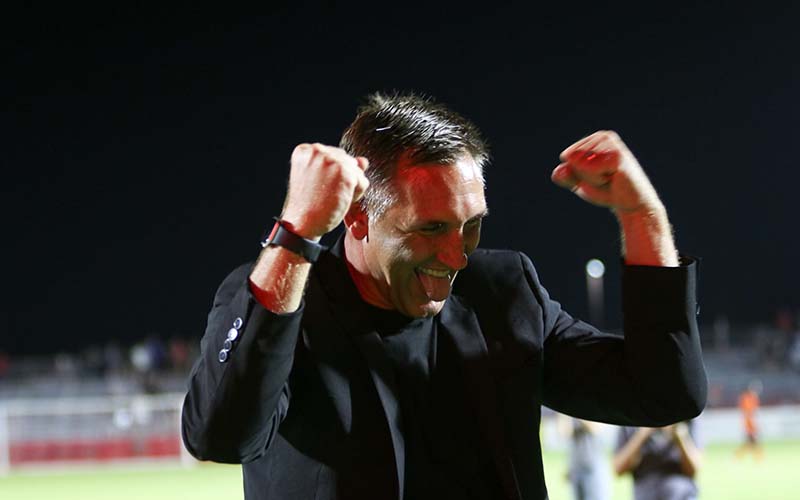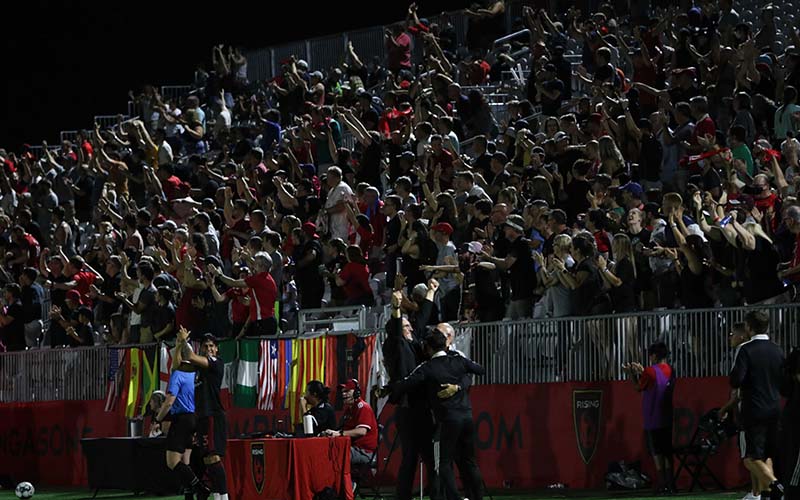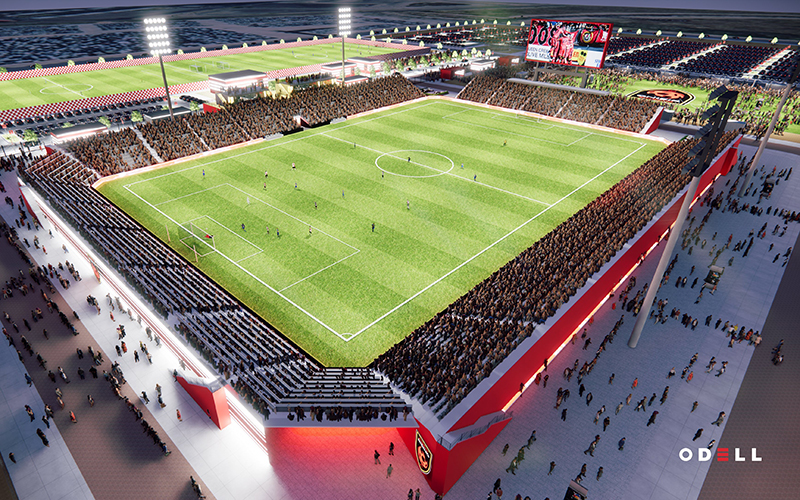
Bally Sports Arizona will broadcast 32 of the Phoenix Rising’s 34 regular-season matches this year. (Photo by Harrison Zhang/Cronkite News)
PHOENIX – With its population and demographics, Phoenix seems like an obvious destination for a first-division soccer team. Its popularity in the Valley was affirmed Thursday with the announcement that Bally Sports Arizona will broadcast 32 of the Phoenix Rising’s 34 regular-season matches this year in the USL.
Last year, MLS commissioner Don Garber identified Phoenix, Las Vegas and San Diego as the top candidates for the league’s 30th team, which won’t start playing until 2023 at the earliest.
But then, on Jan. 20, the Las Vegas Review-Journal reported the MLS had entered into an “exclusive negotiating agreement” with billionaires Wes Edens, a co-owner of the Bucks, and Naseef Sawiris to bring a team to Las Vegas. The Review-Journal reports they “will now work together, focusing on market analysis and planning for a practice facility, corporate offices and stadium.”
While it looks fairly certain the Las Vegas bid will prevail, nothing is set in stone. Before Las Vegas, Sacramento was originally slated to be Major League Soccer’s 30th team before its lead investor pulled out of the deal, shelving the project.
That appears unlikely to happen with the Las Vegas investors group, which would once again leave Phoenix on the outside looking in. Since the Phoenix Rising’s ownership group submitted an expansion bid back in 2017, Charlotte, Austin, St. Louis and now Las Vegas have been granted teams.
For many soccer fans in Phoenix, the confusion is palpable. Phoenix seems like a natural candidate for an MLS team. For starters, it is the fifth-largest city in the country with over four million people in the metropolitan area.
Phoenix is also the 11th largest media market in the country, which means 16 of the 29 MLS teams reside in a smaller city and market than Phoenix. Every media market larger than Phoenix has at least one MLS team.
Beyond just the size of the city and the market, many would say Phoenix is a soccer city.
Thousands of kids across the Valley participate in youth soccer, including many for the Phoenix Rising youth academy. The Phoenix Rising, who play in the second division, are top five in attendance in the USL, averaging over 6,000 fans a game. The Rising recently built a 10,000-seat soccer-specific stadium at Wild Horse Pass.
“The goal was to be one of the best organizations in North America, not just the United States,” Phoenix Rising coach Rick Schantz told Arizona Sports. “Whatever league we were playing in, (the owners) wanted to be the best and they’re striving to be at the top division, to be one of the best teams and to build that brand here in Phoenix and in Arizona. I do know that our ownership is driven, extremely motivated, always having conversations.”
Garber has highlighted the attendance at the Gold Cup Final, which was played at Allegiant Stadium in Las Vegas over the summer, as a reason why the city can support a team. The game between the United States and Mexico, which is always a big draw, was played before a capacity crowd of more than 61,000.
That same tournament, two of the quarterfinal games were held at State Farm Stadium in Glendale and drew equally large crowds. Mexico and Honduras faced off in front of 64,000 screaming fans.
Phoenix has been chosen to host big soccer matches on many occasions. In 2019, also at State Farm Stadium, 62,000 fans watched the Gold Cup semifinal between Mexico and Haiti. In the summer of 2016, State Farm Stadium was the site of three Copa America games, which is widely considered one of the most prestigious international soccer tournaments in the world.
Phoenix has been drawing large crowds to soccer games for 15 years, since a 2007 friendly match between the United States and Mexico was played in front of 62,000 fans.
Phoenix also has the right demographics for soccer to thrive. The MLS has made no secret that it hopes to attract a younger audience, and 43% of Phoenix’s population is under 30.
In addition, Phoenix also has a huge Latin American population. 42% of the city’s population is Hispanic, a demographic that has driven the popularity of soccer in the Valley.
“I think that there’s a lot of potential for a lot of support here,” Niall McCarthy, a longtime Rising season ticket holder and host of The Fan Experience podcast, said. “If you look at the demographics of our state, a lot of people come from south of the border, and their big sport is soccer, is football, and so I think that they’re ready to embrace an Arizona team.”
It seems the people of Phoenix have supported soccer any chance they have gotten, so why have cities like St. Louis or Nashville been given MLS franchises first?
MLS Commissioner Garber has said that weather conditions play into it. The MLS season takes place in the summer, and while the average temperatures in Las Vegas and Phoenix in July and August are comparable, the Las Vegas ownership group is reportedly committed to building an indoor stadium.
Garber pointed to Glendale’s State Farm Stadium, which has a retractable roof, and Las Vegas’s domed Allegiant Stadium as models – though not to scale – for MLS franchises in those cities.

The Phoenix Rising are top five in attendance in the USL, averaging over 6,000 fans a game in their recently built 10,000-seat soccer-specific stadium at Wild Horse Pass. (Photo by Harrison Zhang/Cronkite News)
“Temperature being what it is,” Garber said, referring to Phoenix’s 107-degree average in July, “that would be what I would say would have to happen in order for Phoenix to be a great first- division team in Major League Soccer.”
Other factors could be in play. None of the Rising’s owners are U.S.-based billionaires, while the Vegas bid is backed by two billionaires with American ties.
The expansion fee to join the MLS is at least $200 million. It has been reported that St. Louis paid up to $325 million just to secure a team. Once the expansion fee is paid, a new stadium is the next expense.
Due to the summer temperatures, a team in Phoenix would have to build a stadium with indoor capabilities. The Rising has an outdoor stadium with a 10,000-seat capacity, while most MLS stadiums fall within the 20,000 to 30,000 seat range.
It has been reported that total costs to start the new Las Vegas franchise could reach $1 billion, once facility costs are included. The financial outlay could be a reason Phoenix has yet to be awarded a franchise.
After what happened in Sacramento the MLS must be extra diligent vetting expansion bids.
Back in 2017, the Phoenix Rising announced they had partnered with Goldman Sachs to help privately fund a climate-controlled MLS stadium if the Phoenix bid was chosen, however, it is unclear if this deal remains intact.
Another reason some suspect Phoenix is still on the waiting list is because of the saturation of professional sports teams in Phoenix.
When you look at some of the other recent expansion locations such as St. Louis or Austin, they don’t have the professional sporting prowess of Phoenix, which has professional basketball, football, baseball and hockey, along with the Rising. There’s an argument to be made that, with so many teams already in Phoenix, an MLS franchise wouldn’t get enough support.
Phoenix’s major-league soccer dream isn’t quite dead yet. Garber said in a preseason media call that the league isn’t ruling out eventually expanding beyond 30 teams.
“As soccer becomes more popular and more cities see the opportunity with their fans and their communities to host a first-division MLS club, we’ve got to process all that and determine whether MLS will be a 32-team [league] at some point in the future,” Garber said.
If MLS does decide to further expand it would likely add just two more teams to the league, creating two even 16-team divisions, like the NFL. Beyond that, additional teams are unlikely to be added.
Considering the Phoenix bid was among the top-three considered by Garber and the MLS this go-round, it’s likely they will once again be in the conversation if and when another expansion team is added.
“I know that a lot of people are waiting to get involved in Phoenix Rising, waiting to get to that top-level, so they can talk about them in the same terms that they talk about our other top-level teams, the Suns, the Cardinals and whatnot,” McCarthy said. “So, I feel bad for the ownership. I feel bad for those fans. I’m not losing any sleep about it, because I love Phoenix Rising regardless of what league they’re playing in.”


